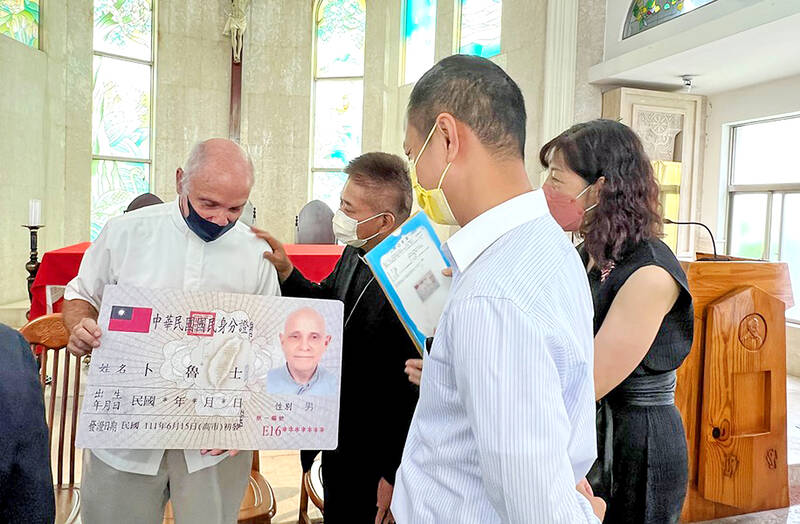A plan to relax regulations on naturalization processes advanced yesterday, with the Executive Yuan approving proposed amendments to the Nationality Act (國籍法), including provisions to protect children’s rights, a reduction of the wait period to two years and waiving fees for exceptional applicants.
The Ministry of the Interior’s proposed amendments are part of the government’s efforts to attract and retain foreign talent.
The act stipulates that foreigners have to have stayed in Taiwan for at least 183 days per year for three or five consecutive years, depending on circumstances, to start the naturalization process, but the amendment would lower the requirement to two years.

Photo courtesy of the Kaohsiung City Government
The ministry said that all fees in the naturalization process — totaling NT$1,200 — would be waived for foreigners who have contributed to the medical field, social welfare, education and other fields in Taiwan.
The proposed amendments would also change all mentions of “unmarried and underaged foreigners” to “unmarried and those under the age of 18” to reflect a revision to the Civil Code stipulating that the age of majority in Taiwan is 18, it said.
Children without a nationality are eligible for naturalization alongside their parents, but the act would be amended to allow social welfare establishments and other facilities to be guardians, ensuring that stateless children would be included, the ministry said.
The proposed changes also take into account articles of the Public Officials Election and Recall Act (公職人員選舉罷免法), it said.
The amendments would remove public officials who represent indigenous areas from office if they hold dual nationalities, it said.
Premier Chen Chien-jen (陳建仁) said that the amendments would help Taiwan observe the spirit of the UN Convention on the Rights of the Child and provide a resolution for stateless children in Taiwan.
Taiwan ratified the convention in 2014 and signed an Instrument of Accession in 2016, despite not being an official signatory to the UN convention.

A Chinese freighter that allegedly snapped an undersea cable linking Taiwan proper to Penghu County is suspected of being owned by a Chinese state-run company and had docked at the ports of Kaohsiung and Keelung for three months using different names. On Tuesday last week, the Togo-flagged freighter Hong Tai 58 (宏泰58號) and its Chinese crew were detained after the Taipei-Penghu No. 3 submarine cable was severed. When the Coast Guard Administration (CGA) first attempted to detain the ship on grounds of possible sabotage, its crew said the ship’s name was Hong Tai 168, although the Automatic Identification System (AIS)

An Akizuki-class destroyer last month made the first-ever solo transit of a Japan Maritime Self-Defense Force ship through the Taiwan Strait, Japanese government officials with knowledge of the matter said yesterday. The JS Akizuki carried out a north-to-south transit through the Taiwan Strait on Feb. 5 as it sailed to the South China Sea to participate in a joint exercise with US, Australian and Philippine forces that day. The Japanese destroyer JS Sazanami in September last year made the Japan Maritime Self-Defense Force’s first-ever transit through the Taiwan Strait, but it was joined by vessels from New Zealand and Australia,

SECURITY: The purpose for giving Hong Kong and Macau residents more lenient paths to permanent residency no longer applies due to China’s policies, a source said The government is considering removing an optional path to citizenship for residents from Hong Kong and Macau, and lengthening the terms for permanent residence eligibility, a source said yesterday. In a bid to prevent the Chinese Communist Party (CCP) from infiltrating Taiwan through immigration from Hong Kong and Macau, the government could amend immigration laws for residents of the territories who currently receive preferential treatment, an official familiar with the matter speaking on condition of anonymity said. The move was part of “national security-related legislative reform,” they added. Under the amendments, arrivals from the Chinese territories would have to reside in Taiwan for

CRITICAL MOVE: TSMC’s plan to invest another US$100 billion in US chipmaking would boost Taiwan’s competitive edge in the global market, the premier said The government would ensure that the most advanced chipmaking technology stays in Taiwan while assisting Taiwan Semiconductor Manufacturing Co (TSMC, 台積電) in investing overseas, the Presidential Office said yesterday. The statement follows a joint announcement by the world’s largest contract chipmaker and US President Donald Trump on Monday that TSMC would invest an additional US$100 billion over the next four years to expand its semiconductor manufacturing operations in the US, which would include construction of three new chip fabrication plants, two advanced packaging facilities, and a research and development center. The government knew about the deal in advance and would assist, Presidential